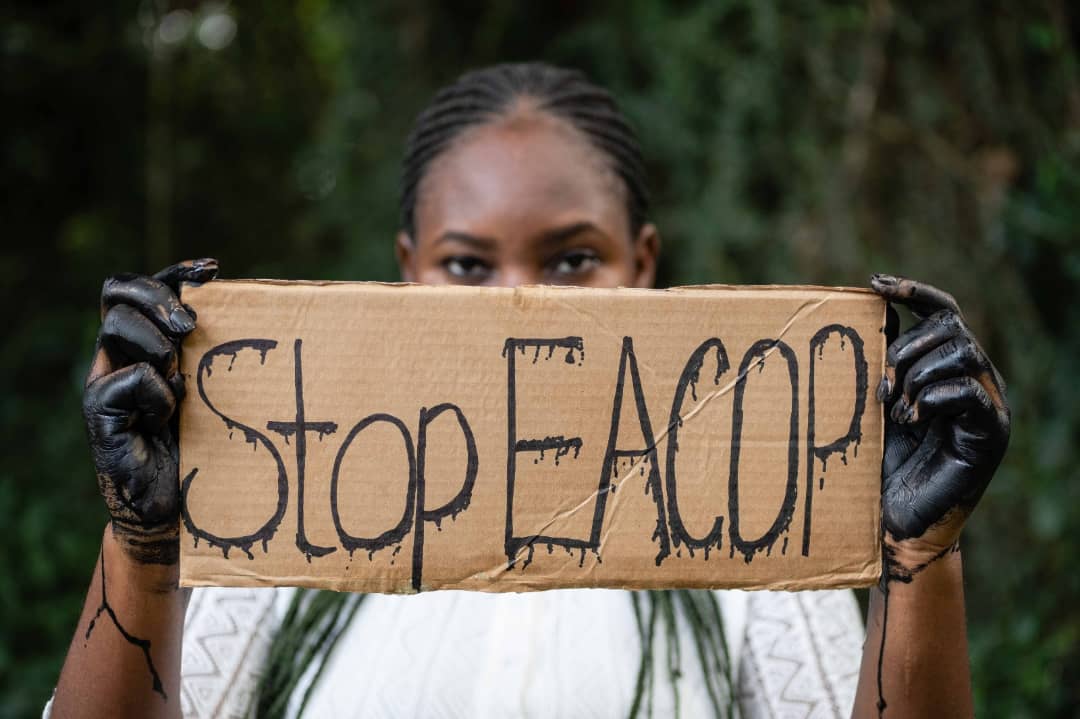
What can Catholics do to prevent the implementation of a deadly fossil infrastructure project? Gathered by the Laudato Si’ Movement in a webinar on May 23, several experts and activists offered insights on the EACOP project and ways to act together.
Since its foundation, the Laudato Si’ Movement has brought together and amplified the voice of Catholics toward decision-makers and political leaders, so that they can tackle the structural causes of the ecological crisis. The continued development of fossil fuel infrastructure is one such cause that damages Creation. We know that we must collectively get out of fossil fuels “without delay” (LS 165) – yet many projects continue to emerge, supported by the oil and gas majors but also by financial actors such as banks.
Among these ticking “climate bombs”, the EACOP project faces a strong mobilization of Catholics: in Tanzania and Uganda, where the project is developed, in France, where the headquarters of TotalEnergies are, but also elsewhere.
EACOP, a climate bomb
EACOP? Behind the acronym, several projects. First, the Tilenga and Kingfishers projects will exploit hydrocarbon deposits in Uganda, 400 wells on the shores of Lake Albert. Then, the East African pipeline project (known as EACOP), 1444 kilometers of heated pipes crossing sensitive ecological areas. Together, the projects represent a considerable threat: 40 million people depend on water sources potentially polluted by these infrastructures, dozens of threatened species are likely to see their habitats degraded,at least one hundred thousand people are displaced by this project. But it is also a problem for all humanity today and tomorrow: the project will allow the emission of 34 million tonnes of CO₂ each year for decades, which reinforces the already dramatic global warming.
Mobilizations in Africa and Europe
On the spot, despite the political and economic pressure, affected persons and activists for climate justice are working to prevent the project from happening. As Christian Hounkanou of 350.org Africa points out: “we need a real energy transition, not this model of the past “. The various people involved, such as the Ugandan chapter of the Laudato Si’ Movement, raise awareness about the local and global damages of the project, and ask the financial actors not to fund it.
In France, Friends of the Earth echo the voices of those affected. Thanks to the due diligence law, a pioneering initiative by France, they initiated a trial that aims to have the human and environmental rights violations of the project recognized. Despite the difficulties of the procedure, the legal approach makes it possible to raise awareness of more and more citizens in France and elsewhere. The mobilization of civil society in France brings together a lot of people: the scientific community, environmental organizations,but also religious actors. “This broad front increases the chances of bringing the legal fight to a successful conclusion”. says Marcellin Jehl, advocacy and litigation officer at Friends of the Earth France. In addition to TotalEnergies, other actors from Northern countries are likely to be complicit in this destruction, especially financial institutions. Under citizen pressure, most of the major French banks committed not to directly fund EACOP.
And the Catholics?
What contribution fromCatholics? As Benoit Halgand, a Christian environmental activist, reminds us, “in France we saw the emergence of political, scientific and even financial consensus against this project – and many of us felt that a strong voice from Catholic leaders was missing “. Finding their justification in the encyclicals and prophetic words of the Holy Father himself, a group of young Catholics therefore challenged the bishops to speak out clearly and truthfully about the project. This approach did not succeed, yet the 400 signatories of the open letter to the bishops are taking action to unify their lives of faith and their desire to see true climate justice emerge. Among other things, dozens of people found themselves in “circles of silence” at the foot of TotalEnergies headquarters in Nanterre, a “non-powerful” way of expressing their disagreement while praying together. “We want to stay in joyful and creative struggles – in the hope of visible or invisible fruits. A “generous commitment, which can become a place of encounter with Christ” according to the young man.
Sylvette, Laudato Si’ animator from France, also takes action to try to prevent this climate bomb. Connected with many people committed to climate justice, she wrote a letter to the CEO of Crédit Agricole, a large French bank financing TotalEnergies, and delivered it to the manager of her nearest bank branch. “Before going there, I was able to chat on WhatsApp with many people who were sharing their experiences. It was dynamic, engaging, even exciting. I’m not really an activist, so I was afraid of having to argue, but the person who met me seemed to discover the problem of his bank’s financing fossil projects. »
In East Africa as in Europe, the mobilization of the faithful is useful in trying to prevent damage to Creation, but it is also a visible sign of the Spirit at work through the universal Church.





